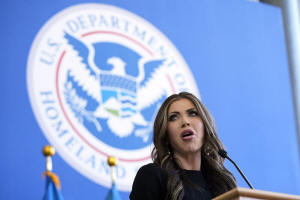Trump administration revokes deportation protections for 600,000
Venezuelans
 Send a link to a friend
Send a link to a friend
 [January 30, 2025]
By REBECCA SANTANA and GISELA SALOMON [January 30, 2025]
By REBECCA SANTANA and GISELA SALOMON
WASHINGTON (AP) — Homeland Security Secretary Kristi Noem said Wednesday
that the Trump administration has revoked a decision that would have
protected roughly 600,000 people from Venezuela from deportation,
putting some at risk of being removed from the country in about two
months.
Noem signed a notice reversing a move by her predecessor, Alejandro
Mayorkas, in the waning days of the Biden administration to extend
Temporary Protected Status. The change is effective immediately and
comes amid a slew of actions as the Trump administration works to make
good on promises to crack down on illegal immigration and carry out the
largest mass deportation effort in U.S. history.
“Before he left town, Mayorkas signed an order that said for 18 months
they were going to extend this protection to people that are on
Temporary Protected Status, which meant that they were going to be able
to stay here and violate our laws for another 18 months," Noem told “Fox
and Friends.”
“We stopped that,” Noem said.
Experts and advocates said the immediate impact among those affected
would be uncertainty and fear.
“I’m scared even though I’m here legally and I arrived legally," said
Caren Añez, a 41-year-old single mother who requested TPS in 2023 and
received it in 2024, after arriving in the U.S. on a tourist visa. “I am
distraught, seeing how else I can stay here legally.”

Añez said she left Venezuela because she feared being arrested for
working as an independent news reporter for a Venezuelan site. She now
works as office manager in Texas and said returning home is not an
option.
“I cannot enter Venezuela because my life is in danger,” she said.
More than 7.7 million Venezuelans have left their home country since
2013, when its economy unraveled and President Nicolas Maduro took
office. Most settled in Latin America and the Caribbean, but after the
pandemic, migrants increasingly set their sights on the U.S.
Venezuelans’ desire for better living conditions and their rejection of
Maduro and his policies are expected to keep pushing people to emigrate.
Ahead of the presidential election last year, a nationwide poll by
Venezuela-based research firm Delphos showed about a quarter of the
population thinking about emigrating if Maduro was re-elected. Earlier
this month, Maduro was sworn in for a third six-year term despite
credible evidence that he lost July’s election by a two-to-one margin.
Under the Biden administration extension, protections for Venezuelans
were extended until October 2026. That now reverts to two separate
designations — one that expires this April and one in September.
[to top of second column]
|

Homeland Security Secretary Kristi Noem speaks to employees at the
Department of Homeland Security, Tuesday, Jan. 28, 2025, in
Washington. (AP Photo/Manuel Balce Ceneta)

Venezuelans would lose their ability to work in the U.S. and be at
risk of being deported.
Noem has until Saturday to decide what to do about the group whose
protections expire in April and until July 12 for those whose
protections expire in September. If she does nothing, the
protections automatically extend for another six months.
The U.S. doesn’t have diplomatic relations with Venezuela, limiting
deportation options.
Federal regulations allow the extensions to be terminated early,
though that’s rarely been done, and groups sued when Trump took
steps to end the protections during his first term.
The National TPS Alliance, an advocacy group, said Wednesday that it
is prepared to challenge this decision in court.
Congress created TPS in 1990 to prevent deportations to countries
suffering from natural disasters or civil strife, giving people
authorization to work in increments of up to 18 months at a time.
About 1 million immigrants from 17 countries are protected by TPS,
including people from Venezuela, Haiti, Honduras, Nicaragua,
Afghanistan, Sudan, Ukraine and Lebanon. Venezuelans are one of the
largest beneficiaries.
The TPS designation gives people legal authority to be in the
country but doesn’t provide a long-term path to citizenship. They
are reliant on the government renewing their status when it expires.
Critics have said that over time, the renewal of the protection
status becomes automatic, regardless of what is happening in the
person’s home country.
In addition to Venezuelans, the Biden administration in its waning
days also extended the protections to more than 230,000 Salvadoreans,
103,000 Ukrainians and 1,900 Sudanese already living in the U.S.
Noem did not say what would happen to them, and the DHS notice only
refers to Venezuelans.
The policy change was first reported Tuesday by The New York Times.
___
Regina Garcia Cano contributed from Caracas, Venezuela
All contents © copyright 2025 Associated Press. All rights reserved
 |